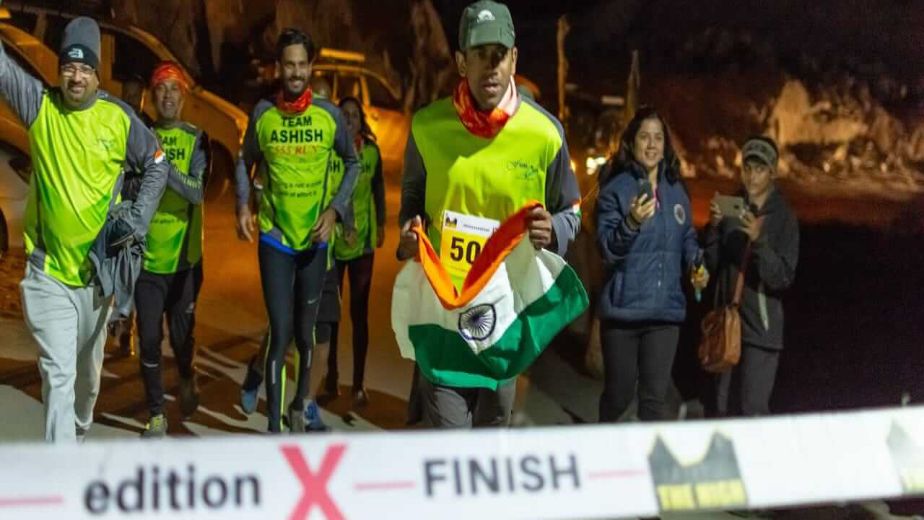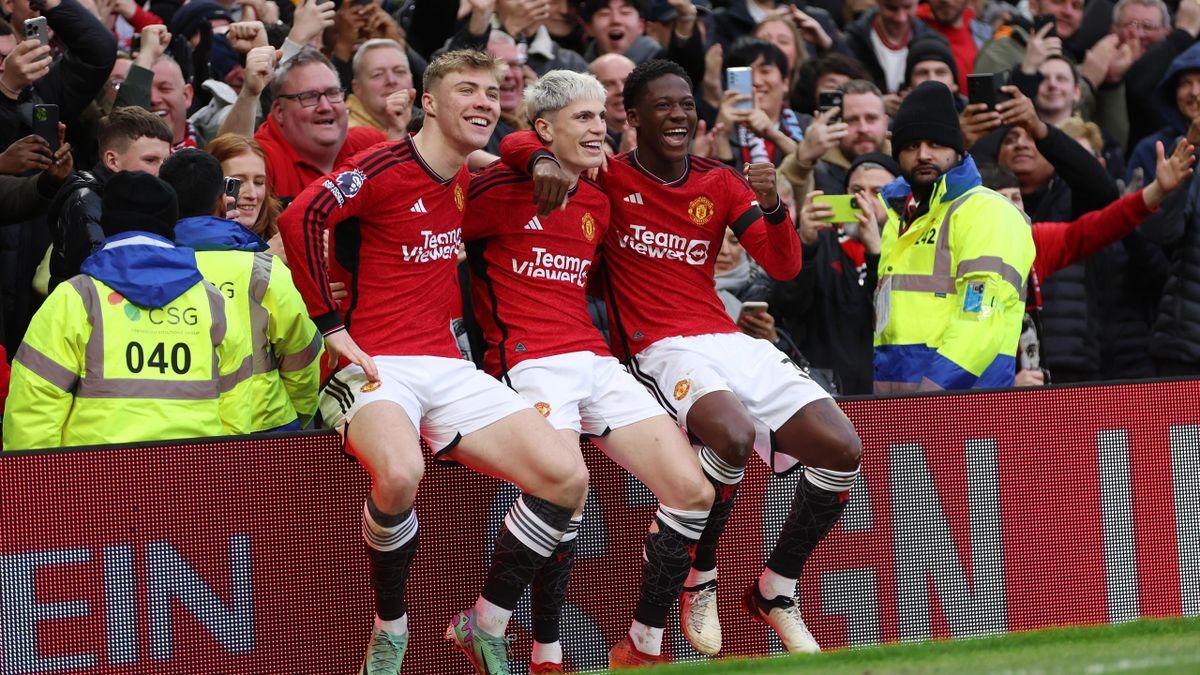In 2019, Ashish Kasodekar made history by becoming the first Indian to successfully finish the most challenging and cruelest race on Earth, the 555 kms La Ultra Marathon at Ladakh. Out of the five participants competing in the race, Ashish finished third and covered the distance in under 132 hours.
At an exclusive interview with SPOGO, Ashish explained what goes into the preparation for an event of this nature, the challenges that he faced, the importance of mental strength, resilience and a positive attitude to achieve glory and his plans for the future.

Before undertaking an ultra-marathon, how do you mentally prepare yourself for such a monumental task?
Actually Saad, this is not an overnight thing. This goes on for a long period, it’s a journey. I started with 15 kms in 2013, then did 21 kms then 42, 72 so basically I have gradually built it up to this particular level. I didn’t register for 555 with excitement, it never happened that way. It was a beginning, and I feel the beauty of running in Ladakh is that the Himalayas always call you back. When you’re in the Himalayas, you meet so many people, you meet different types of people doing different things in life and that keeps you motivated all the time and you feel like doing something in your life. I strongly believe that we must have a story for ourselves, we should do something that at the end of the day makes us feel nice about ourselves, kuch toh zindagi main kar raha hoon. That feeling is important, because we’re not born just to pay light bills, telephone bills, GST, life is much more. That keeps me going, because of this I like to do what I’m doing. Another thing I would say is ultra-running is an individual sport, and one must spend time with themselves. When you spend time with yourself, you’re focused and positive. The moment there are two people together, there is conversation, usually it lands up as a negative conversation. We start blaming things like the government, the situation or whatever. It gets into a negative zone, but when a person is alone they are trying to understand and explore themselves and are in a positive mindset. Nobody is saying they’re bad or can’t do anything. It doesn’t happen when you’re alone, so you’re positive. The moment you have a goal, then life becomes positive and happy and the small things remain small and you’re focused about what you want to do in life. That’s how I’ve come to the level of 555, from 2013 to 2019.

How do you keep yourself going when you feel like giving up?
I’ll tell you what happens at the events, you always want to give up because there comes a point where the mental strength comes in the picture. Physically, you usually give up immediately, the muscles give up. But mentally, we can do wonders and according to me everybody can do wonders. It’s just about using your mind at the right time. What I do is, whenever I feel like giving up is I always think about the finish point. What I think is how do I celebrate my finish, whether I will jump, do push ups or whatever. I think of all vague options to celebrate my success, and that gives me positivity. So at that particular time, suppose it’s a 100 kms run, at 60-70 kms you think arey main kya kar raha hoon, it’s time to quit, i’ll come back again with better practice and I will do it again, but it doesn’t happen. Because tomorrow will be there, but we don’t know if we will be there tomorrow. So at that particular time, what you need to do is just think about the celebration and keep going. That has always worked for me, it gives me happiness and the moment you’re out of that point, you’re back in the zone of running, the event and you’re through.
How do you motivate yourself to push beyond your limits and achieve more every year?
I’m always surrounded by good people in the world. You know Saad, there is a difference between listening and hearing and I feel that we must listen to people. When you start listening to people you’ll understand there are so many things happening. A small child can also teach you lots of things. That will only happen when you listen to things, it’s very very important. The moment you say you’re a champion and you’ve done whatever is required, that’s the end of your success. According to me listening is very very important, the moment you’re with your people and focused on your goal, the type of people you meet are a part of your journey. They are also positive and that’s what keeps me going. I’ll tell you a small story about how discipline and madness works. I used to do Sinhagad Fort climbing regularly, which is in Pune and I do it in the afternoon. My basic belief is that to achieve something you need to be out of your comfort zone, so I do Sinhagad Fort climbing in daytime, when it’s 35-40 degrees. When I went there for the first time, the watchman looked at me and said that I should come in the morning when the weather is nice. When I told him I liked it in the afternoon, he looked at me, made some weird faces like I’m mad. I came back again next Thursday, he looked at me again. He kept on seeing me every Thursday and slowly he realized that even though he believed I was mad, I had discipline. He started waving out to me, asking me if I needed something, water or parking. He became a friend, he had some respect for me. When you do something, when the madness is supported by discipline you can build a community with you. These are the things that kept me going to do better and better.

Mental Health of an athlete is often overlooked, how important has mental well-being been for you in everything you have accomplished in your journey?
Saad I’ll tell you, mental health is very very important. According to me, 70% is your mental strength and 30% is your physical strength. I have worked hard to develop my mental strength, it doesn’t happen overnight. There are no exercises that you can do to increase your mental strength. Two or three things that I follow is that you must love what you do, it’s very important. When you’re passionate about something, mad about something it doesn’t trouble you. You’re enjoying yourself, it doesn’t give you pain because you’re enjoying that soreness and pain. So what you love is very very important and since I’m a runner I’ll talk about running. If running is giving me trouble, it’s not the option for me. I should love whatever I do, that’s number 1. For every person, there is a point where they have to choose love and fear, and they should choose love, which makes life good. Usually people choose fear, such as fear of losing, injury, society etc. So it’s important to love what you do. Also it’s very important to step out of your comfort zone. What I do is, if it’s very hot outside I train with the mindset that I’m going to enjoy this. The moment you have a positive approach, everything changes. Your perception towards your run changes and that makes all the difference. So stepping out of the comfort zone, running in 35 – 40 degrees where most people run early in the morning because it’s a good time to run, but according to me if you want to achieve something extreme, it’s very important to do something out of your comfort zone. Mental strength plays a very important role everywhere.
What advice would you give to an aspiring athlete to become successful?
I’ll talk from the running point of view, if tomorrow Saad says that Ashish has run so much, even I should start running if you feel that way, and I’m not talking only about you but in general you must go ahead and do whatever you like instead of spending money. If tomorrow I feel like running is a good option for me, I should get up and go out and do some runs, fast walking or whatever. Instead of waiting to buy Asics shoes, dri-fit t-shirts, Nike shorts etc. Don’t get into all these things, if you feel like doing something go for it. It’s very very important. After 8-10 days you will realize that you really like this, or it's not for you. Unless and until you do that, it’s not going to happen. Usually we sit and analyze things, but I would say if you like something then go for it. Do it and then take a call whether you really want to get into it, when choosing between love and fear, choose love. Do it for yourself instead of other people, do it for your own happiness. Every person should do something in life that gives them happiness, usually we do things that give us certificates, medals, money we always do something with expectations of getting something, but when the answer is happiness it changes your perception towards life. It’s very very important for every person to do it, very important.
What are your future goals and how are you planning to accomplish them?
There are plenty of goals. I’m a daydreamer and I love to dream, with the 555 I’ve completed the high altitude run. I’ve done the cruelest marathon, I’m looking at Badwater, I did Brazil 135 so I want to do the highest marathon in the world, the longest marathon in the world so that’s what I’m looking at. Presently I’m looking at Badwater, which is in July and it’s the toughest foot race in the world. There is an Everest marathon as well on 29th of May. I think a very important factor that runners always face is the financial part. It’s very difficult to get sponsors for runners because running is not a very popular sport. There are ways to do crowdfunding, so I have to arrange my finances for my targets. I’m going to make a yearly schedule for whatever I have to do and then start talking to people about sponsorships. That’s how I will achieve it. So as of now for this year my goals are all about running.
What thoughts went through your mind when you were competing in the ultra-marathon?
There are different feelings that I went through. When I finished my first ultra-marathon in 2016 I was just 200 metres away from the finish line. It was tough for me to handle that situation initially because when I finished they told me that I’m not a finisher and I should come back next year. Sympathy messages. It taught me a lot of things, that I cannot be casual about what I do, you have to be serious whenever you register for something because people follow and care for you. Ladakh you are in a different zone completely because you're an individual, you have your crew with you. Most of the time, you’re in the beautiful zone of the Himalayas looking at the beautiful stars running on your own thinking about different options. At 333 I had a dramatic finish where I never got a chance to feel that finish. I was hallucinated and I thought I had already finished my race. As there were Indian participants for the first time, the organizers wanted me to run. So I had a different feel and it was tough for my crew members to take me to the finish line. I finished the ultra-marathon just 31 seconds prior, the cut off was 72 hours and I finished in 71 hours, 59 minutes and 29 seconds. So it was a traumatic finish I had at 333 so I never had the chance to feel that finish. It was a different finish at 555 because we were well prepared, my crew team was absolutely fantastic, they took care of almost everything. I never had a cramp or blisters. I had a very strong finish for 555. For me I never had the pressure of being the first Indian to finish this, what will happen then etc. I never had the pressure because I was there to attempt that race. Usually in Ladakh it's not a race, it’s an experience because you’re at a high altitude, less oxygen levels, temperature variations and snowfall. So I never experienced any pressure in my attempt, we were happy, singing and dancing and I ended up finishing that race. The beauty of finishing 555 was it was my dream, one person’s dream of finishing 555 kms in Ladakh, then I got hold of my friends, crew members, there were about seven of them including two of my brothers, younger brother Amit and older brother Anil and it became a dream of seven people. When I started the race, which was a 5 and a half day event, there were at least a 1000 people who I directly know in Pune who were involved in the race. They had formed different groups and were following me. So for those 5 and a half days, there was happiness, positivity and everybody was looking forward to me finishing. They were keeping track of my progress at every stage and one person’s dream brought happiness to so many people.

How did you cope with the stress a marathon of this nature takes on the body and the mind? What alternatives did you have in case things didn’t go according to plan?
Actually Saad, I say that when you’re doing an extreme sport there is no plan B. The moment you have a Plan B it means that you’re looking forward to something. According to me there should not be any Plan B for extreme sports. When you’re in business, the corporate world there is a Plan B, Plan C etc but in extreme sports there cannot be a Plan B, there has to be Plan A and you have to go for it. If something goes wrong then you have to react at that particular time. You have to be 100% committed to achieving your goal with Plan A so according to me there should not be any Plan B.
How important is it to have an understanding of your body to push yourself to the limit?
When you’re running alone it helps you understand your body very well. Usually there are a lot of injuries that happen and we have to go to the doctor. According to me, when we understand our bodies, we know whether it’s injury or soreness, how long you can stretch yourself, whether this can be recovered on our own. I had achilles tendon pain before I started 555 and my physio said this is going to be painful and that I shouldn’t do long running. There was swelling and she (physiotherapist) gave a lot of things like cushionings, various types of taping etc. When I got to the race, there was pain and the organizer who is a doctor also looked at it and said that this is going to be dangerous. But I had no other option, and believe me when I started my race it was raining and I knew that when it rains in Leh it will be snowing in the passes. When I started the race there was pain but there was some connection between the achilles and the brain, who said to each other that I’ll take care of the achilles you take care of the race. After that day there was no pain at all till today. So it’s just that it’s a beautiful body we have, and the Himalayas can do wonders. For any athlete, it’s very important to understand your body very well.














